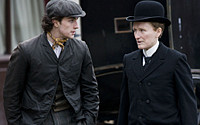
scr Glenn Close, John Banville
prd Glenn Close, Bonnie Curtis, Julie Lynn, Alan Moloney
with Glenn Close, Janet McTeer, Mia Wasikowska, Aaron Johnson, Pauline Collins, Brendan Gleeson, Mark Williams, Brenda Fricker, Jonathan Rhys Meyers, Maria Doyle Kennedy, Bronagh Gallagher, Kenneth Collard
release US 27.Jan.12
11/Ireland 1h54

The other man: Johnson and Close



TORONTO FILM FEST
 Based on a true story, this introspective film seems to suggest that these events aren't perhaps as extraordinary as they appear. But the strong premise is weakened by writing and direction that never get a grip on the story.
Based on a true story, this introspective film seems to suggest that these events aren't perhaps as extraordinary as they appear. But the strong premise is weakened by writing and direction that never get a grip on the story.
In 1898, Albert (Close) works at an upscale Dublin hotel, and no one suspects that he's actually a woman. Quietly going about his work while saving to open a tobacco shop, Albert is unassuming and relentlessly polite. Then he's asked to share his room with visiting painter Hubert (McTeer), who learns his secret and reveals one of his own: he's a woman too. But Hubert has managed to have a normal married life. This inspires Albert to pursue the hotel maid Helen (Wasikowska), which is complicated by her lusty relationship with handyman Joe (Johnson).
The plot is involving, as are the issues it explores. The film continually finds present-day resonance in 19th century Ireland, mainly because it avoids politics: both Albert and Hubert have turned to cross-dressing for deeply personal reasons that have more to do with who they are than the harsh environment for single women. And the film throws in sideways comments that these issues are just as relevant in the upper classes.
But the film stumbles by refusing to focus on Albert's story. Like Albert himself, his journey lurks in the movie's corners, as the filmmakers get distracted by Helen and Joe's messy romance. It's well-played by Wasikowska and Johnson, but its passion and complexity undermine Albert's journey, which should be even more wrenchingly emotional.
This certainly isn't Close's fault: she approaches the role from the inside out, conveying everything with a flick of an eye or a slight tilt of the head. And her brave, raw scenes with McTeer are electric, partly because McTeer's uncanny performance bursts with imposing physicality in stark contrast to the mousy Albert. In one exquisite scene, these two "men" go for a stroll in frilly dresses, showing just how distant their femininity has become. If only the film had kept its focus more securely on them, we would have emerged at the end both shaken and empowered. As it is, we're just left pondering a strange little story.
 |
themes, language | 20.Nov.11 |

 Still waiting for your comments ... don't be shy.
Still waiting for your comments ... don't be shy.
HOME | REVIEWS | NEWS | FESTIVAL | AWARDS | Q&A | ABOUT | TALKBACK